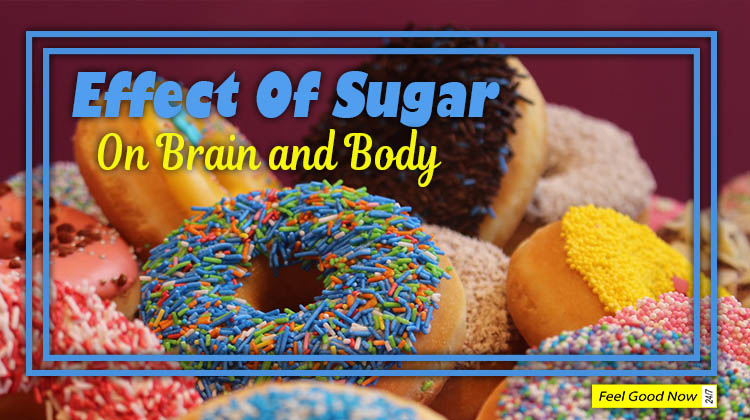
Sugar is a generic name given to sweet-tasting, soluble carbohydrates. Glucose, sucrose, lactose, maltose, fructose, and galactose are different types of sugars. Sugar is considered harmful to our health, and in this article, we will see the effect of sugar on our brain and body.
Importance of sugar
Before we see the terrible effects of sugar, let us first know the importance of sugar in our bodies. An appropriate amount of sugar is needed for the proper functioning of the body. Glucose is a form of sugar and is the primary energy source for every cell in the body. The brain, rich in neurons, and nerve cells, is one of the most demanding organs of the body and needs a lot of energy.
The brain’s functions are memorizing, thinking, and learning, which are linked to glucose levels. All this depends on how effectively the brain uses this fuel source. With the lack of glucose available to the brain, the neurotransmitters the chemical messengers are not produced, and communication between neurons breaks down.
Besides, hypoglycemia, a common complication of diabetes, is caused by low glucose levels in the blood. Low glucose level leads to loss of energy for brain function and is closely related to insufficient attention and cognitive function.
Thus sugar is vital for those bursts of energy. But anything in excess is harmful, and it is 1000 percent true regarding sugar.
Regular food vs. sugary food
If we eat the same regular healthy diet every day, soon we get bored of it. This thing happens because the same food fails to release the same amount of the feel-good chemical dopamine in our brain after some time. It is good because it forces us to try different foods, thus fulfilling the body’s need for various nutrients.
However, when it comes to sugar, our brain behaves differently. The dopamine levels don’t fall, and thus we never feel bored of sugary items, which makes us over-consume sugar and leads to sugar addiction over time. This behavior is similar to consuming harmful drugs, though sugar addiction is not as vigorous.
The people in the ancient period used to take calorie-rich foods that aided survival when food was scarce. But now, in the modern world dominated by cars, Wi-Fi, and a sedentary lifestyle, consuming sweets leads to obesity and diabetes.
Sugar’s reward response
When eaten, the high-glycemic food (i.e., foods which raise blood sugar quickly, e.g., cakes, candies, and ice cream) activate the tongue’s sweet receptors. These receptors send signals to the brain.
The cerebral cortex in the forebrain region processes the sweet taste and activates the brain’s complex network of reward systems. It urges you to eat the sweet food again. It provokes more intense feelings of hunger.
As the food reaches the guts, they signal the brain to produce more insulin to deal with the sugary food. Regular high consumption of sugary items increases sugar tolerance, leading to sugar addiction. Also, the body starts failing to make proper use of the insulin produced, leading to type 2 diabetes.
From the guts or intestine, the sugar goes to the liver. The liver starts storing the extra sugar, producing liver fat and sending more fat into the blood. It causes higher levels of triglycerides and cholesterol, leading to cardiovascular issues.
Decreased insulin ability causes more fat formation, starting a vicious cycle. The fat starts depositing around the stomach leading to other worse conditions such as heart diseases, diabetes, high blood pressure, vision issues, etc.

Harmful effects of too much sugar
Apart from increasing the risk of type-2 diabetes, sugar also affects other parts of your body. Let us see the effects on them one by one.
Teeth
The bacteria responsible for rotten teeth or cavities thrive on sugar. Thus, your parents were right when they asked you not to eat too many chocolates when you were a kid. Sweet items do affect dental health. Brushing teeth in the morning and at night before bed helps protect teeth from the attack of these bacteria.
Weight Gain
As mentioned above, the extra sugar gets stored as fat. It causes weight gain, especially if you get addicted to sugary or starchy items. Sugar is not only in sweet foods but also in bakery items, ketchup, peanut butter, fruit juice, bottled smoothies, potato chips, etc. So be careful of what you are eating. Always go for low-glycemic index foods such as eggs, fish, eggplant, tomatoes, avocado, etc. It is always better to eat these items as they contain some nutrients too compared to the sugary items with no nutritional value.
More Acne
Sugary items tend to increase the glucose levels in the blood, leading to a sudden increase in insulin levels. These increased insulin levels may increase the production of skin oils and lead to clogging of follicles, causing acne.
Increase risk of certain types of cancer
All cells use sugar for energy and growth. Cancerous cells are no different. Thus too much sugar can increase the chances of the disease.
Looking older
Advanced glycation end products (AGEs) are harmful compounds formed when protein or fat combines with sugar in the bloodstream. This process is called glycation.
According to this study, accumulating advanced glycation end products (AGEs) on nucleotides, lipids, and peptides/proteins is an inevitable component of the aging process.
Addiction
As we saw above, sugar consumption results in dopamine release and makes us feel good. It makes us eat sugary items more than we should. It leads to a loss of control and a craving for more dopamine. Regular high consumption of sugar will make us addicted to the high we get from sugar consumption. So better to use willpower and consume sweets only once in a while.
Emotional issues
People with diabetes fail to keep a proper hold on their emotions. Mood swings are common.
Also, as per this Medical Express article, high sugar consumption is associated with increased chances of depression and anxiety.
High sugar consumption can also cause memory and cognitive issues.
Heart
High sugar in the bloodstream makes the body release more insulin. Over time, the extra insulin can affect the arteries making them stiff and rigid. It may lead to cardiovascular diseases, high blood pressure, risk of stroke, etc.
Pancreas
Type-1 diabetes occurs when the body (pancreas) cannot make any or enough insulin. It develops mainly during childhood.
Type-2 diabetes occurs when the body cannot make use of insulin. In this case, the pancreas may still produce insulin, but the body’s cells cannot use it properly, thus causing the pancreas to create even more insulin. Over time, the pancreas becomes damaged and may stop producing insulin altogether.
Kidneys
Too much sugar in the blood over time may affect the functioning of kidneys which filter out waste from the blood.
Liver
According to britishlivertrust.org.uk, too much sugar can cause obesity, and being obese is a contributing factor to liver disease.
Non-alcohol-related fatty liver disease (NAFLD) will likely overtake alcohol as the leading cause of liver disease in the next few years.
We saw above how the liver converts the extra sugar into liver fat. A fatty liver, in turn, cannot do its job of breaking down sugar properly, leading to even more fatty deposits.

Can you retrain your brain to crave less sugar?
Can we reverse the effects of sugar addiction or high sugar consumption? Or can we retrain our brain to crave less sugar? Well, it depends on the severity of dependence on sugar.
Suppose you are addicted to sugar and decide to go on a sugar detox diet. In that case, there is a high chance you may experience withdrawal symptoms such as headache, tiredness, sleepiness, cravings, feeling down, irritability, anxiety, etc. However, these are temporary symptoms and will disappear as your body adjusts slowly to the reduced or low sugar intake.
Try to sleep well, drink more water, exercise, eat fresh veggies, fruits, and protein-rich foods, and relax until your body gets used to the lower sugar intake.
According to wellandgood.com, you can see the good results of cutting-out sugar in less than two weeks.
Alright, so we saw the effect of sugar on the brain and body. We hope you learned some important stuff.
Let us know your thoughts below in the comments section.
You may like:
- 8 Best Yoga Poses To Lose Belly Fat
- Covishield vs Covaxin vs Sputnik V: A Quick Comparison
- Best Outdoor Activities To Relieve Stress
- Effect Of Sugar On Brain And Body
- Does Drinking More Water Help You Lose Weight?
- How to Meal Prep Healthy School Lunches
Author Profile
- Loves writing on health, home, and personal development topics.






Any comments?